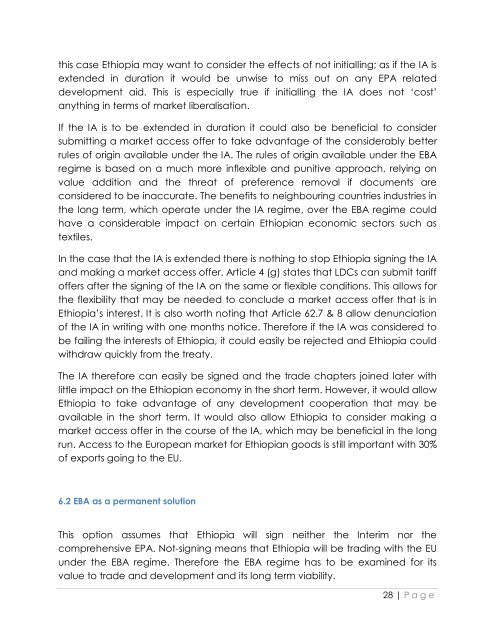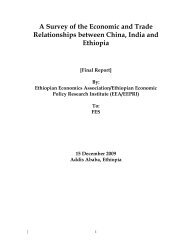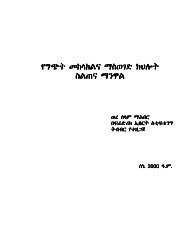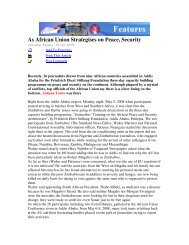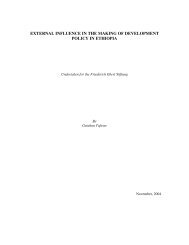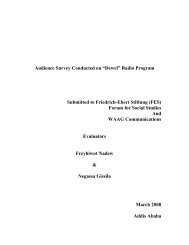Ethiopia and EPA Negotiation 2008 - FES Ethiopia
Ethiopia and EPA Negotiation 2008 - FES Ethiopia
Ethiopia and EPA Negotiation 2008 - FES Ethiopia
Create successful ePaper yourself
Turn your PDF publications into a flip-book with our unique Google optimized e-Paper software.
this case <strong>Ethiopia</strong> may want to consider the effects of not initialling; as if the IA is<br />
extended in duration it would be unwise to miss out on any <strong>EPA</strong> related<br />
development aid. This is especially true if initialling the IA does not ‘cost’<br />
anything in terms of market liberalisation.<br />
If the IA is to be extended in duration it could also be beneficial to consider<br />
submitting a market access offer to take advantage of the considerably better<br />
rules of origin available under the IA. The rules of origin available under the EBA<br />
regime is based on a much more inflexible <strong>and</strong> punitive approach, relying on<br />
value addition <strong>and</strong> the threat of preference removal if documents are<br />
considered to be inaccurate. The benefits to neighbouring countries industries in<br />
the long term, which operate under the IA regime, over the EBA regime could<br />
have a considerable impact on certain <strong>Ethiopia</strong>n economic sectors such as<br />
textiles.<br />
In the case that the IA is extended there is nothing to stop <strong>Ethiopia</strong> signing the IA<br />
<strong>and</strong> making a market access offer. Article 4 (g) states that LDCs can submit tariff<br />
offers after the signing of the IA on the same or flexible conditions. This allows for<br />
the flexibility that may be needed to conclude a market access offer that is in<br />
<strong>Ethiopia</strong>’s interest. It is also worth noting that Article 62.7 & 8 allow denunciation<br />
of the IA in writing with one months notice. Therefore if the IA was considered to<br />
be failing the interests of <strong>Ethiopia</strong>, it could easily be rejected <strong>and</strong> <strong>Ethiopia</strong> could<br />
withdraw quickly from the treaty.<br />
The IA therefore can easily be signed <strong>and</strong> the trade chapters joined later with<br />
little impact on the <strong>Ethiopia</strong>n economy in the short term. However, it would allow<br />
<strong>Ethiopia</strong> to take advantage of any development cooperation that may be<br />
available in the short term. It would also allow <strong>Ethiopia</strong> to consider making a<br />
market access offer in the course of the IA, which may be beneficial in the long<br />
run. Access to the European market for <strong>Ethiopia</strong>n goods is still important with 30%<br />
of exports going to the EU.<br />
6.2 EBA as a permanent solution<br />
This option assumes that <strong>Ethiopia</strong> will sign neither the Interim nor the<br />
comprehensive <strong>EPA</strong>. Not-signing means that <strong>Ethiopia</strong> will be trading with the EU<br />
under the EBA regime. Therefore the EBA regime has to be examined for its<br />
value to trade <strong>and</strong> development <strong>and</strong> its long term viability.<br />
28 | P a g e


